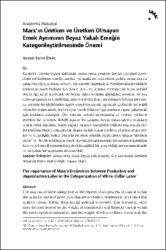Marx’ın Üretken ve Üretken Olmayan Emek Ayrımının Beyaz Yakalı Emeğin Kategorileştirilmesinde Önemi
Özet
Kapitalist üretim biçimi dahilinde, sermayenin yeninde üretim döngüsü içerisinde rol üstlenen emeğin analizi, bu analiz zorunlu olarak politik sonuçlara da sahip olacağı için daima sorunlu bir mesele olagelmiştir. Neoliberalizmle birlikte toplam sermaye birikimi içerisinde ticari ve finansal sermayenin; buna paralel olarak işçi sınıfı içerisinde de beyaz yakalı kesimin ağırlığının artması, bir kez daha tartışmayı alevlendirmiş; kafa ve kol emeği ayrımı sermaye birikim sürecinde zorunlu bir işbölümüne işaret etmekten ziyade işçi sınıfı içerisinde müstakil bölmeler tanımlamak, hatta beyaz yakalı bölmeyi işçi sınıfının dışına çıkartmak için kullanılır olmuştur. Öte yandan, ortada incelenmesi ve teorize edilmesi gereken bir fenomen olduğu açıktır. Bu çalışma, beyaz yakalı işlerde istihdam edilen emek gücünün halen sağlıklı biçimde kategorize edilememiş olduğu değerlendirmesinden yola çıkarak, klasik politik iktisat ekolü tarafından ortaya atılan ve en gelişkin haline Marx’ın bu ekole yönelik eleştirisinde ulaşan “üretken emek” ve “üretken olmayan emek” kavramsallaştırmasının bu sorunsal açısından kafa ve kol emeği ayrımından çok daha sağlıklı bir araç olduğunu savunmaktadır ve bu yönde bir uygulama denemesidir. The analysis of labor taking role in the reproduction process of capital within the capitalist mode of production has always been a problematic issue since this analysis cannot refrain from having political outcomes. This discussion once more became heated as the weight of commercial and financial capital within the total capital accumulation and the weight of white-collared workers in the working class became more pronounced with the rise of neoliberalism. Within this discussion, the distinction between manual and intellectual labor have come to be used frequently to define distinct, self-contained divisions within the working class, and in some cases even separate completely the white-collared section from the working class, instead of pointing to a necessary division of labor in the process of capital accumulation. On the other hand, it is obvious that the phenomenon at hand requires investigation and theorization. This article, departing from the assessment that the labor power employed in white-collared jobs is yet to be adequately categorized, claims that the conceptualization of “productive labor” and “unproductive labor” that was put forth by the classical political economy school and took its most sophisticated form in Marx’s critique of it provides a much sounder tool for this problematic than the distinction between manual and non-manual labor; and is an attempt at facilitating it as such.


















